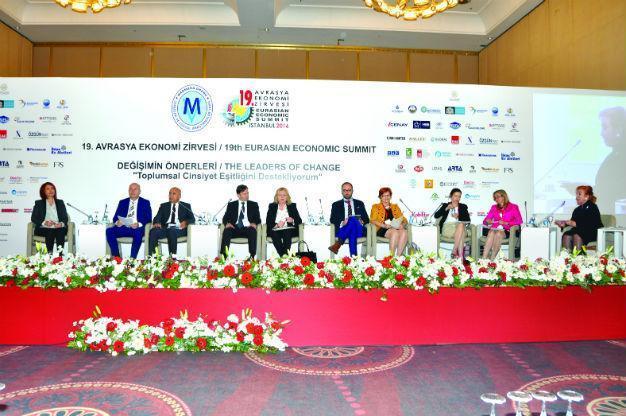‘Quotas for women artificial but needed’

Though it is artificial to set quotas for women in politics, as women and men live together “naturally” in society, they are needed to engage women also in the political life, a Kosovar minister said.
“It is artificial to put quotas for women to join politics,” said Edita Tahiri, a minister of the Republic of Kosovo during the “I support social-gender equality” session of the 19th Eurasian Economic Summit yesterday.
The “Gender-Sensitive Workplace Models and Transformation Programs” session was moderated by Müjgan Suver, the chairwoman of the Marmara Group EU and Human Rights Platform.
After stating that quotas were artificial, because men and women reside naturally together and in other parts of society, Tahiri added that it was needed to establish women’s representation in politics.
Explaining her own political career, Tahiri said she had entered politics while her country was at war, when nobody cared about her gender. It wasn’t until after the war, she stated people began to emphasize her gender.
“When gender balance [in the political arena] changes, there will be no more need for quotas,” Tahiri said.
Alenka Bratusek, former Slovenian prime minister and Slovenia’s first woman prime minister, gave an example from her country about gender quotas.
Bratusek said women need to make at least 35 percent of any candidate lists of political parties that enter the parliament but there were not quotas set for business boards.
Adding that she was one of the four women at the European Union council meeting when she first attended it in 2013, Bratusek said companies led by female managers were more successful than companies run by men.
Bratusek said that one of the problems women faced in politics was media.
Though her male predecessors did not face any comments over the way they looked, Bratusek said after she became prime minister, her clothing and her shoes were often a topic of discussion.
“Women are under more scrutiny than their male colleagues,” she said.
“In Slovenia we say, ‘When men cannot solve problems it’s time for women to take the lead,’” said Bratusek. “The future is for women to lead.”
Damir Masic, a member of the parliament of Bosnia and Herzegovina, said quotas were especially needed for women at the managers’ level, so as to implement a more “systematic approach to improve women’s place in the society and politics.”
Gender committee formed in Turkish Cyprus
Speaking at the summit, Meral Akıncı, first lady of the Turkish Cyprus, said she and her husband were working to increase the representation of women for a gender-equal society.
Akıncı said a social gender equality committee was established within the scope of the peace talks currently being conducted with the Greek Cypriot administration.
“Gender equality is also [being] discussed for the federal political solution that is envisaged to be established on the island,” added Akıncı on April 6.
The number of women outnumber their male colleagues on the committee, according to Akıncı. She said the committee has female perspective, and is dedicated to promoting a violence-free life for women and freedom-based approach that contributes to the peace process on the island.
“This committee represents the civil society version of peace culture,” she said.
President Akıncı and his Greek Cypriot counterpart, Nicos Anastasiades, have relaunched the U.N.-brokered peace talks to find a solution to the more than 40-year-old conflict in the island.
Both Akıncı and Anastasiades have expressed that the negotiations were going positively and a peace deal could be reached by the end of this year.
Recognizing that the gender equality situation in the Turkish Cypriot administration was not at target level, the Turkish Cypriot First Lady said modern laws were being passed by the parliament to secure equal representation of both genders, adding that her husband, President Akıncı, stressed the importance of the issue through his actions and speeches.
As she takes the issue of gender equality very seriously, she said, she founded women civil society organization KAYAD, which works to promote of community development, peace education and cross-cultural education.
 Though it is artificial to set quotas for women in politics, as women and men live together “naturally” in society, they are needed to engage women also in the political life, a Kosovar minister said.
Though it is artificial to set quotas for women in politics, as women and men live together “naturally” in society, they are needed to engage women also in the political life, a Kosovar minister said.